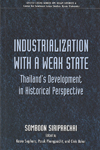This post is also available in: Japanese
Industrialization with a Weak State:
Thailand’s Development in Historical Perspective.
Somboon Siriprachai. Edited by Kaoru Sugihara,
Pasuk Phongpaichit and Chris Baker.
August, 2012.
Description
This collection of essays by Somboon Siriprachai offers a critical assessment of Thai industrialization, with a focus on industrial policy, rent seeking and income inequality. An economist by training, Somboon saw the Thai state as authoritarian rather than developmental, and criticized the adoption of policies that were oriented toward increasing government revenue instead of nurturing industrial development. While these policies achieved growth, they did not strengthen Thailand’s technological ability and industrial skills, or promote research and development. Somboon disputed the World Bank’s classification of Thailand as a Newly industrializing Economy (NIE), supporting his position with empirical evidence and comparisons with Japan, South Korea and Taiwan. The success of these East Asian countries, he suggested, rested on the competence of the state to direct the accumulation process rather than reliance on any particular strategy for industrialization. Arguing that increased industrial productivity is the key to a country’s living standard and its ability to compete in the world market, he contended that government intervention was essential to successful late-comer industrialization.
Combining institutional economics with astute historical analysis, Somboon’s work provides a unique perspective on the transition of the Thai economy from around the mid-nineteenth century until 2000. His essays are a valuable contribution not only to Thai studies but also to the study of economic development of late-comer countries generally and the role of the state in that process.
